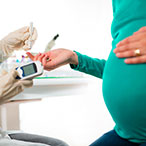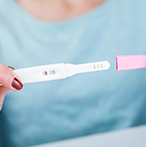News & Updates
NICHD issues Releases and Media Advisories to the news media. Science Updates and Spotlights explain NICHD research findings and public health issues to the general public. An Item of Interest is a short announcement such as an initiative launch or a notable staff change. Director’s Corner posts are monthly updates from the NICHD director.
Science Update: High levels of certain forever chemicals during pregnancy linked to mid-life obesity, NIH-funded study suggests
Science Update: Sleep-disordered breathing during mid-pregnancy may be linked to poor infant outcomes, NIH-funded study suggests
Science Update: Children born to women with COVID-19 could be at risk for heart disease, diabetes in later life, NIH-funded study suggests
Science Update: Caffeine consumption during pregnancy may lead to slightly shorter child height
Science Update: Hormone prevents obesity in offspring of pregnant mice with obesity, according to NIH-funded study
Science Update: Pre-pregnancy obesity may increase child asthma risk, NIH study suggests
Science Update: Placental genetic material in maternal blood could potentially diagnose gestational diabetes early, small NIH-funded study suggests
Science Update: Weight loss before infertility treatment does not improve live birth rate in unexplained infertility, NIH-funded study suggests
Media Advisory: Sleep-disordered breathing in early pregnancy linked to insulin resistance
Release: NIH data challenge seeks innovative methods for identifying complication risks in first-time pregnancies
Release: Eating habits change only slightly after gestational diabetes diagnosis, NIH study suggests
Release: Moderate daily caffeine intake during pregnancy may lead to smaller birth size
Release: Pregnant women in third trimester unlikely to pass SARS-CoV-2 infection to newborns
Science Update: Vegetarian diets during pregnancy associated with small infant birth weight
Science Update: Women with asthma may be at higher risk for weight gain during pregnancy, NIH study suggests
Science Update: Mouse study links exercise during pregnancy to lower risk of obesity in offspring
Science Update: Fetal weight gain may begin long before gestational diabetes is commonly diagnosed
The excess body fat seen in infants born to women with gestational, or pregnancy-related, diabetes is associated with higher maternal blood sugar levels as early as the 10th week of pregnancy—long before the time when women are usually screened for the condition, according to a study by researchers at the National Institutes of Health. Moreover, weight gain in the fetuses of women with gestational diabetes first becomes apparent in the 28th week of pregnancy, when many women are first tested for the condition.




















 BACK TO TOP
BACK TO TOP